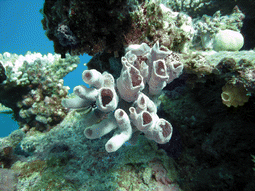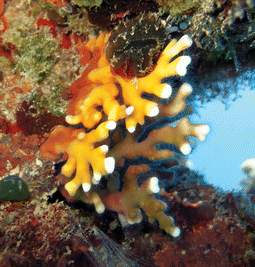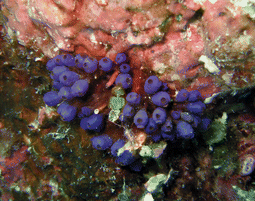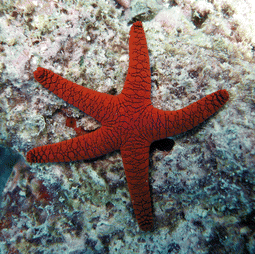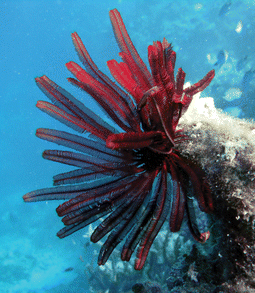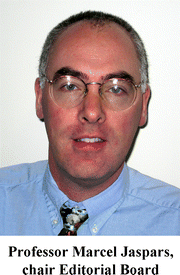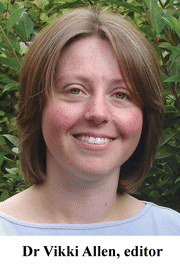Happy New Year from NPR
Abstract
On behalf of the Natural Product Reports Editorial Board and the Royal Society of Chemistry, we wish all our readers and authors a very happy and successful 2007.
Happy New Year from Natural Product Reports
2006 saw the successful launch of Highlight articles, which focus on a topic of current relevance written by high-profile authors. Highlights extend the variety of articles in the Natural Product Reports (NPR) portfolio, complementing the regular and ‘one-off’ articles. These new articles have proved popular with readers.This issue’s Highlight is ‘Marine metabolites: metal binding and metal complexes of azole-bases cyclic peptides of marine origin’ by Anna Bertram and Gerald Pattenden (Nat. Prod. Rep., 2007, 24, DOI: 10.1039/b612600f).
2006 also saw the second NPR special issue, concentrating on natural products chemistry in China, guest-edited by Professor R. X. Tan, Nanjing University. The diversity and coverage of topics indicates that natural products science in China is in good health and advancing rapidly. We would like to thank Professor Tan and all of the authors for their valuable contributions in this effort.
There will be more special issues of NPR on topics relevant to our readership in the coming months and years, building on the success of last year.
Professor David O’Hagan, University of St Andrews, UK, retires as chair of the NPR Editorial Board. David steps down following four years’ service in this role. During this time, David has broadened the journal’s coverage to include carbohydrate chemistry, bioinorganic chemistry and natural product synthesis, and has overseen the development of the special issues and Highlight articles.
We would like to extend our heartfelt thanks to David for his stewardship of the journal, all his hard work and for overseeing NPR’s rise in impact factor. David now joins the International Advisory Editorial Board, and we look forward to his continued advice and input to the journal.
We also see the retirement of Professor James (Jim) Hanson, University of Sussex, UK, the longest-serving member of the NPR Editorial Board, who has been with the journal since its formation in 1984. Jim’s advice and memory of what went before have always been valued, and we will miss him at NPR Editorial Board meetings, although we will continue to receive his input as a member of the International Advisory Editorial Board.
The final retirement is Dr Finian Leeper, University of Cambridge, UK, who steps down from the Editorial Board following six years of service. We would like to thank Finian for his considerable efforts and achievements during these years.
Looking forward
In 2007 we welcome several new members to the Editorial Board. Professor Daisuke Uemura, Nagoya University, Japan, joins us and takes responsibility for the coverage of natural product science in Japan.In broadening the scope of the journal, the inclusion of natural product synthesis will be the brief of two new Editorial Board members: Dr Andrew Phillips, University of Colorado at Boulder, US, who is also author of the excellent marine natural product synthetic reviews; and Dr Andreas Kirschning, University of Hannover, Germany, who will bring his expertise in natural product total synthesis to the journal.
Natural Product Reports Lecture Award
Congratulations to Professor John Blunt, University of Canterbury, New Zealand, who was the recipient of the 2006 NPR Lecture Award. John, lead author of the annual marine natural products review, delivered his lecture at the 47th Annual Meeting of the American Society of Pharmacognosy, Washington DC, US. The lecture, which took place in August 2006, was very well received and attended by nearly 500 people from over 25 countries.This prize is just one of many awarded by RSC Publishing during 2006, a year that has seen more than 20 high-profile researchers gain financial support to present their work at events throughout the world, in recognition of their research achievements. More than £15![[thin space (1/6-em)]](https://www.rsc.org/images/entities/char_2009.gif) 000 (or US$30
000 (or US$30![[thin space (1/6-em)]](https://www.rsc.org/images/entities/char_2009.gif) 000) was granted to the recipients, in total, to cover travel expenses to sponsored lectureships in countries such as China, Japan, US and UK.
000) was granted to the recipients, in total, to cover travel expenses to sponsored lectureships in countries such as China, Japan, US and UK.
Nominations for the 2007 NPR Lecture Award are now closed and the results will be announced early this year.
Journal profile
The 2005 impact factors, released by ISI® in June 2006, showed a large average increase of over 10% for RSC Journals. The impact factor for NPR is an impressive 7.3. Calculated annually, ISI® impact factors provide an indication of the quality of a journal – they take into account the number of citations in a given year for all the citeable documents published within a journal in the preceding two years.Work published in RSC journals is also amongst the most topical. The immediacy index measures how topical and urgent papers published in a journal are by dividing the number of citations in a given year by the number of articles published in the journal that year. Again, NPR registers a significant 2.2. These new figures reinforce the RSC’s reputation as the home of exciting research.
Showcasing hot science from RSC journals in Chemical Science, Chemical Technology and Chemical Biology has proved very popular with readers and authors alike. In fact, the free supplements have become so successful that from January 2007, all issues will be eight pages (in print), contain new article types and come complete with a fresh new look for the front page. Supplementary material will also be available online.
Online readers of Chemical Biology can also view a contents listing of all chemical biology articles published across RSC journals, making it the best place to find both news and research for those in the field.
Meanwhile, Chemistry World, the RSC’s award-winning magazine, launched two new web features at the end of 2006. The Chemistry World Blog is an interactive forum for news, discussion and opinion, looking at the science hitting the headlines. The Chemistry World Podcast features interviews with high-profile scientists about the latest and hottest topics in science, and is free to download at www.rsc.org/chemistryworld.
RSC Open Science
Authors publishing in RSC journals now have the option of paying a fee in exchange for making their accepted communication, research paper or review article openly available to all via the web, with RSC Open Science. The scheme is only made available to authors once their papers have been accepted for publication, following the normal rigorous peer-review procedures (RSC Open Science operates in parallel with the normal publication route, which remains free to authors).Authors who have published their work in RSC journals are also able to retrospectively apply for their work to be included in the scheme. Further information can be found at www.rsc.org/openscience.
Technological innovation
2006 has seen RSC Publishing invest significantly in technological developments across all of its products. Introduced last year, RSS feeds, or ‘really simple syndication’, have proved extremely popular with our readers. Subscribers receive alerts from their journal of choice as soon as an Advance Article is published, providing both the graphical abstract and text from a journal’s contents page. You can subscribe via the NPR homepage.Subscribers to NPR can now link from journals contents lists straight through to the HTML view of selected articles, in just one quick step. Here you can download references to citation managers (such as EndNote, Ref Manager, ProCite and BibTex), sign up for RSS feeds, search for citing articles (otherwise known as ‘forward linking’), print the article with just one click and send the article to a friend or colleague.
From 2007, authors publishing in RSC journals will see their science ‘come alive’ thanks to an exciting new project pioneered by the RSC. Enhanced HTML in RSC articles will allow chemical and biological compounds mentioned in the text to be identified; by clicking on the compound readers will be able to obtain further information about that compound, including a downloadable structure plus a list of relevant subject areas.
The RSC is the first publisher to utilise the International Chemical Identifier or InChI (a digital equivalent of the IUPAC name for any particular covalent compound) for a project of this type and scope. The technology will be used to enhance RSS alerts so that future news feeds can include chemical structures and other enhanced information, like ontology terms. RSC Publishing intends to evolve this project to match author and reader needs, so tell us what you think: we welcome your feedback on this new functionality and will incorporate your ideas to develop the service further. Find out more at www.rsc.org/sciencecomealive.
These developments demonstrate the investment in publishing products and services over the past year, and 2007 will see us enhancing our products further.
Not just journals…
As well as an impressive portfolio of prestigious journals, the RSC has a wide selection of products for anyone with an interest in the chemical sciences. Visit the shop at www.rsc.org/shop to browse over 400 book titles, subscribe to or purchase an individual article from NPR or any other RSC journal, join or renew RSC membership, or register to attend a conference or training event.In addition, RSC Publishing is pleased to announce the launch of the RSC eBook Collection. RSC books are now available online and can be easily downloaded as either chapters or books. The collection is fully searchable and is also integrated with RSC journal content. To search the collection or for further information, visit www.rsc.org/ebooks.
We, and the Editorial Board, are committed to ensuring that NPR remains a high-quality journal that serves the international community. As always, we would appreciate your input either direct to the Editorial Office or through any Editorial Board member on ideas for new review commissions or suggestions on the development of the journal.
We are also happy to receive feedback from authors, especially if it helps us to further improve the publishing experience. We believe that RSC Publishing offers the best service of any scientific publisher, and so we have published a selection of the comments received from authors from around the globe – take a look at www.rsc.org/authorquotes.
On behalf of the Natural Product Reports Editorial Board and the Royal Society of Chemistry, we wish all of our readers and authors a very happy and successful 2007.
| This journal is © The Royal Society of Chemistry 2007 |

